By clicking submit, I consent to my personal data being collected, stored, and processed by Think Pacific in accordance with our Privacy Policy.
Think Global - Immersive Learning
Immersive learning means living it, not just studying it… Connecting with real communities, cultures, and challenges.
Think Pacific brings learning to life through immersive, real-world experiences you can’t find in a classroom. Since 2009, we’ve created journeys that build confidence, spark lasting friendships, and transform perspectives.
Every experience is designed around experiential education and learning by doing, encouraging critical thinking and forming deep and authentic connections with the people and places you encounter. Immersive learning is a specific, more immersive form of experiential learning, proven to boost not only academic understanding, but also teamwork, resilience, leadership, and cross-cultural awareness.
Each programme combines career-boosting experience, cultural immersion, ethical collaboration, and real-world challenge, giving you the confidence, clarity, and practical skills to thrive in a globally connected, impact-driven future.
We build each experience using a unique approach, which is valued by universities snd employers globally. We call it the Think GLOBAL Learning Model.
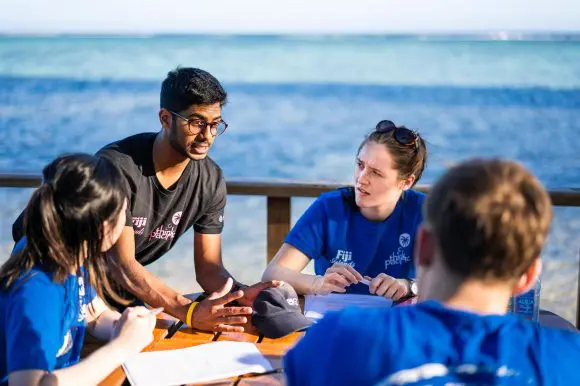
We blend hands-on experience, cultural exchange, and teamwork to build knowledge, resilience, empathy, and global awareness.
- Challenge – Learning through experience, by stepping out of your comfort zone.
- Learn by Doing – Hands-on experiences & cultural exchange.
- Really Live It – Connect authentically with people, places, and communities.
- Skill Development – Build resilience, confidence, adaptability, humility and empathy.
- Think Global – Consider cross-cultural difference, global challenges and problem-solving.
- Lasting Impact – Return with fresh perspectives that inform your thoughts.
- Team Energy – Meet new people, collaborate, share ideas, and build friendships.
Create experiences that stay with you and change the way you see the world.

Whether you’re exploring conservation and environmental protection in Bali or community empowerment in Fiji, you’ll experience issues firsthand, through people, projects, and places that bring your studies to life. By living with local people and learning side-by-side, you develop unrivalled knowledge, experience and connection.
- 📄 Graduate Employability – Gain real-world experience that employers value through hands-on experiential activities and global insight
- 🌎 Cross-Cultural Intelligence – Work alongside local organisations and communities, building global awareness and empathy.
- ✅ Career Depth– Choose a board programme to develop soft skills or immerse yourself in global theme based on your degree or professional aspirations.
- 🚀 Adventure + Purpose – Discover new cultures, try new experiences, and push yourself in a safe, structured, supportive environment.
Build knowledge that shifts perspectives and sets you apart.
Small group journeys designed to shape your future. Our university programmes are a stepping stone to greater confidence, career readiness, and a truly global outlook.

From community immersions that empower your soft skills to career-themed programmes in areas such as Ethical Business, Health or Conservation.

Immerse yourself in authentic local traditions through ceremonies, cooking, crafts and language. Every programme is designed to provide authentic experiences that stay with you.

Unique experiential activities, site visits, hands-on workshops, and learning from local experts. Combine with unaltered cultural immersions – Join a Hill tribe in Thailand, a traditional home in a Bali Banjar, or a remote island community in Fiji.
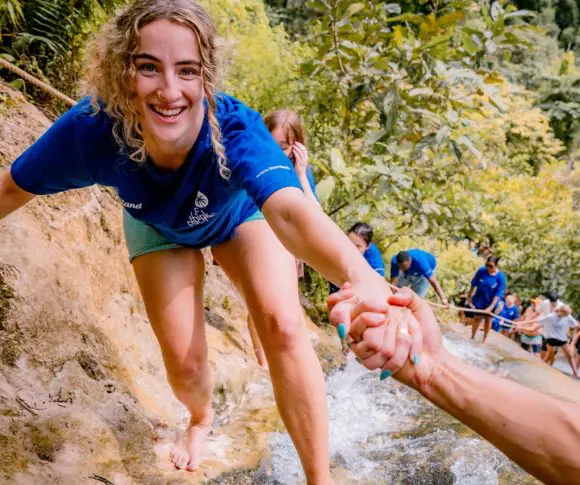
From Jungle hikes and coral snorkelling in Fiji, Rice terraces walks and sunset yoga in Bali or Bamboo rafting and climbing the ‘sticky waterfalls’ in Northern Thailand. Adventures are included as standard.
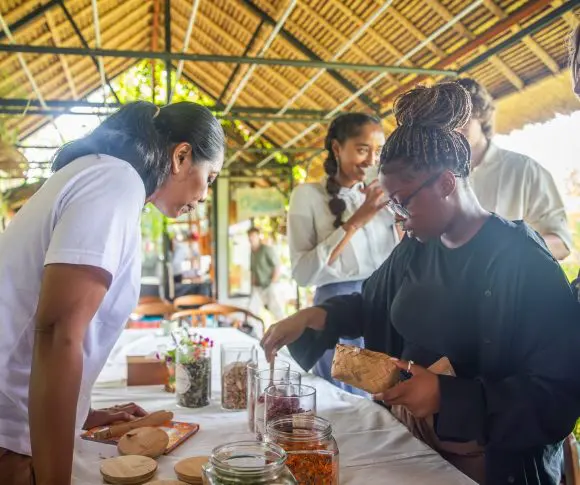
Work as a team to explore local perspectives and answer real questions from community partners. Bring fresh ideas, present your insights, and build practical experience.

Each programme considers sustainability, regenerative principles and local grassroots approaches. We offset carbon from each programme and invest in long-term climate strategies.
Think Pacific’s Learning Approach
Our programmes are built on Experiential Learning a globally recognised model, backed by decades of research, that focuses on learning through doing, reflecting, and applying.
What makes Think Pacific unique is how we bring this to life:
- Immersive Experiences — living within communities and engaging directly with culture, people, and place.
- Structured Journeys — designed to challenge you, build resilience, strengthen teamwork, and expand your global perspective through diverse activities and engagement.
This approach means every Think Pacific experience goes far beyond travel. It’s a chance for real growth, meaningful connection, and lasting impact.
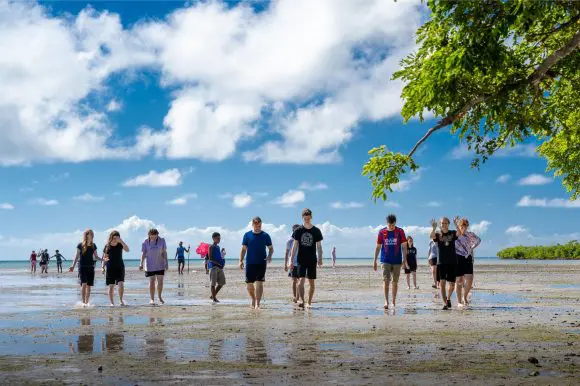
The Think GLOBAL Learning Framework
A six-step pathway we’ve developed over 15+ years, in collaboration with government ministries, community leaders, local changemakers, and 100+ university partners worldwide. Here’s how it’s broken down:
Gather – Arrive prepared, open-minded, curious, and ready to grow.
Learn – Immerse yourself in daily life and shared experiences.
Observe – Look deeper to discover new perspectives and approaches.
Build – Form meaningful connections with people, place and culture
Apply – Turn insights into personal and professional development
Lead – Take your new perspectives home to create change.
This framework helps you connect deeply, reflect meaningfully, and transform real-world immersion into skills that last a lifetime.
Growth, Learning, and Life-Lessons Through Travel.
From the moment you step into Fiji, Bali or Thailand, we encourage you to gather experiences, ideas and friendships. This is your chance to leave behind assumptions, embrace curiosity, and prepare yourself to see the world in new ways.
Live alongside local communities, guided by host families, leaders and grassroots organisations. Through stories, food, tradition and teamwork, you’ll learn directly from the people who call each place home — an education you can’t find in any textbook.
Our programmes slow you down, inviting you to notice the small details of culture, environment and daily life. By observing carefully, you’ll see how communities respond to challenges, with creativity and resilience, gaining insights that challenge your worldview.
From friendships with fellow students to bonds with your host family or local partners organisations. You’ll build trust, share experiences, and create long-lasting connections that go far beyond your expedition. Build a network based on respect, collaboration and exchange.
Every experience, challenge, conversation, and reflection is a chance to grow. You’ll develop real-world skills in teamwork, communication, resilience, leadership, and problem-solving, building confidence for the future and creating standout stories that employers remember.
The experience doesn’t end when you fly home. You’ll return with the confidence, clarity and global awareness to lead change in your studies, career and community, equipped with stories, insights and purpose to inspire others.

Here’s what you’ll take away:
- ✅ Renewed Purpose – Bring your degree, personal interest or professional aspirations to life.
- 📄 Graduate Employability – Gain skills & experiences that employers really value.
- 💬 Cultural Intelligence – Increase your adaptability, empathy, and global communication.
- 🌐 Global Perspectives – Understand complex issues from the ground up, within real communities.
- ✍️ A Standout Story – Insights you’ll use in personal statements, job applications & interviews.
- 🧭 Clarity & Confidence – Discover your values, strengths, and future direction.
- 🤝 Lifelong Friendships – Travel with strangers who become like family.
- 📸 Unforgettable Moments – Adventure, connection, and unique memories.
- 📜 Certificate – A professional credential to showcase your learning on LinkedIn and your CV.
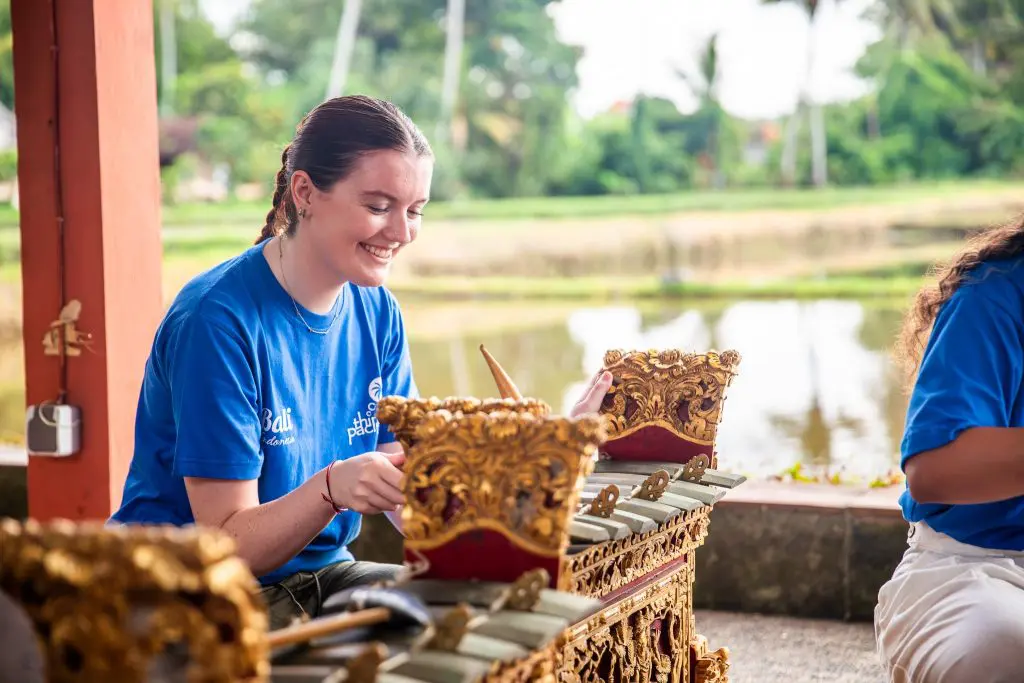
Think Pacific programmes are based on the models of Experiential Learning, which include Immersive Learning and Expeditionary learning. These approaches are widely recognised as powerful in expanding understanding through active participation, reflection, and application. Here some further background on how these models connect:
✅ Experiential Learning
-
Theoretical foundations: Developed by David Kolb (1984), the Experiential Learning Cycle (experience → reflection → conceptualisation → application) remains one of the most cited frameworks in higher education. It emphasises that knowledge emerges through the transformation of lived experience, rather than passive absorption.
-
Proven outcomes: Research shows that experiential methods increase retention, problem-solving ability, and critical thinking skills compared to lecture-based instruction (Kolb & Kolb, 2005). Learners demonstrate stronger transfer of knowledge to real-world settings.
-
Global applications: Experiential learning is deeply embedded in medicine, nursing, business schools, and teacher training, where practical placements, simulations, and reflective practice are considered essential. In nursing and healthcare, studies show experiential learning fosters clinical judgement, cultural competence, and empathy (Cant & Cooper, 2017).
-
Relevance for students abroad: When applied in immersive contexts like Bali, Thailand, or Fiji, experiential learning allows students to apply theory to practice, for example by connecting public health frameworks studied in class to community-based health promotion in real villages.
✅ Immersive Learning
Origins: Immersive learning is a form of experiential education rooted in real-world engagement. It draws on Kolb’s Experiential Learning Cycle (1984) but takes it a step further by placing learners inside authentic environments — from cultural immersion and community projects to simulations and hands-on practice. The goal is to learn not only about a subject, but to live it.
Proven outcomes: Research shows immersive learning improves knowledge retention, empathy, and problem-solving skills (Herrington & Oliver, 2000; Cant & Cooper, 2017). In healthcare, immersive simulations and cultural placements strengthen clinical judgement, intercultural communication, and confidence. Learners report higher engagement and deeper personal growth compared to classroom-based study.
Beyond academics: Immersive learning creates powerful emotional connections by requiring students to step into another perspective. Living with a host family, participating in traditional rituals, or working on real community challenges builds empathy, adaptability, and resilience. These qualities are increasingly valued in both personal development and professional pathways.
Relevance in global programmes: In study abroad and field-based contexts, immersive learning is a key driver of intercultural competence and global citizenship (Deardorff, 2006). By experiencing life in another culture first-hand, students expand their worldviews and develop practical skills that support employability and leadership in diverse settings.
Alignment with Think Pacific: Homestays in Fijian villages, joining Balinese healthcare workshops, or collaborating with Thai grassroots organisations exemplify immersive learning. Students don’t just study culture, health, or sustainability — they live within it, reflect on it, and grow personally and professionally as a result.
✅ Expeditionary Learning
-
Origins: Built on the philosophy of Kurt Hahn, founder of Outward Bound, who championed learning through challenge, service, and adventure. The model was adapted into schools in the U.S. (EL Education) and now serves over 4,000 teachers and 500,000 students annually.
-
Proven outcomes in schools: Evaluations of EL Education schools show consistently higher results in student engagement, academic achievement, and character growth compared to national averages (Meier, 2014; Mathematica Policy Research, 2013).
-
Beyond academics: Expeditionary learning stresses service, teamwork, and reflection. Studies link these experiences to the development of resilience, adaptability, and intercultural competence — qualities increasingly recognised as essential for both career readiness and global citizenship (Passarelli & Kolb, 2011).
-
Relevance in global programmes: In the context of study abroad, expeditionary learning is closely tied to intercultural learning and employability outcomes. Research shows that immersive, challenge-based international experiences foster cultural intelligence, empathy, and professional adaptability (Vande Berg, Paige, & Lou, 2012).
-
Alignment with Think Pacific: Living with host families in Fiji, engaging with Balinese traditional medicine, or collaborating with Thai conservation NGOs exemplifies expeditionary learning. These journeys are structured challenges where students must adapt, engage, and reflect, leading to deep personal and professional growth.
📈 Impact: Why It Matters Today
-
Employability: Employers increasingly highlight skills like teamwork, adaptability, problem-solving, and cross-cultural communication as critical (World Economic Forum, 2020). Both experiential and expeditionary learning directly cultivate these.
-
Global Citizenship: Immersive programmes build intercultural competence (Deardorff, 2006), giving students the ability to communicate and collaborate across cultures — vital in globalised healthcare, business, and sustainability sectors.
-
Personal Development: Studies across Outward Bound, EL Education, and higher education abroad consistently show lasting increases in confidence, empathy, and leadership among participants.
-
Academic Integration: Expeditionary learning connects theory to practice, making abstract academic concepts tangible. For example, students studying public health can witness first-hand how sanitation challenges are addressed in Balinese villages.
✨ In Summary
-
Experiential learning has decades of evidence across disciplines, showing it improves knowledge retention, critical thinking, and professional readiness.
-
Immersive learning is a specific, more immersive form of experiential learning — proven to boost not only academic understanding, but also teamwork, resilience, leadership, and cross-cultural awareness.
-
Together, these approaches make Think Pacific programmes in Bali, Thailand, and Fiji transformative — equipping students with the skills, perspectives, and confidence valued by universities, employers, and global society.
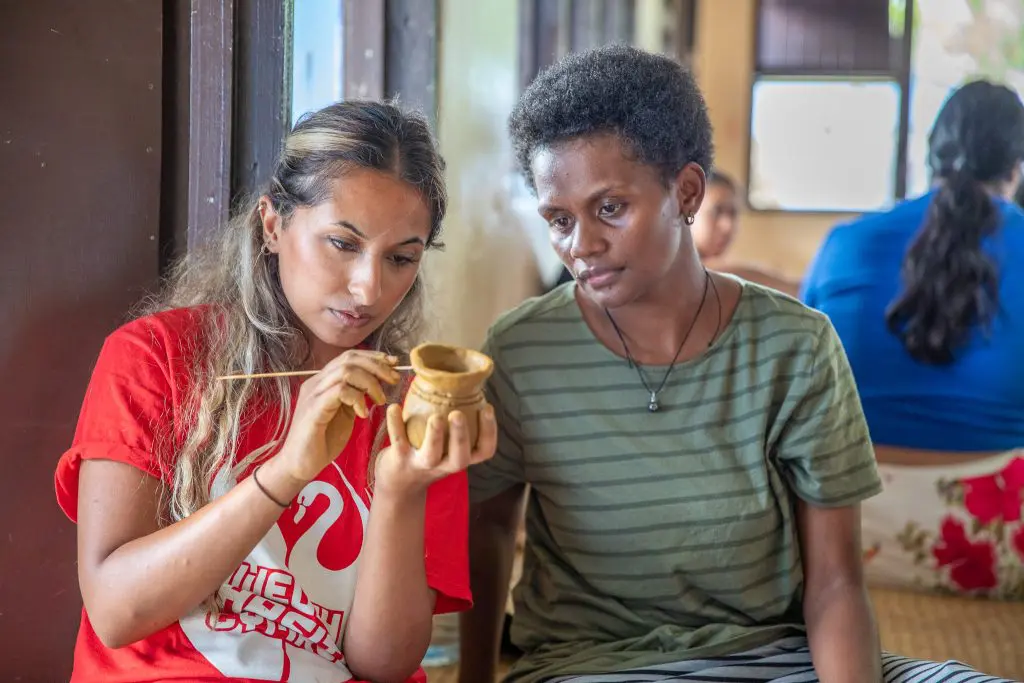
🌏 Learning Outcomes of Our Programmes
Immersive programmes in Bali, Thailand, and Fiji go far beyond traditional study abroad, volunteering or internships. They combine expeditionary learning with cultural immersion, giving students the chance to live in communities, collaborate with local leaders, and engage with pressing global issues in real-world contexts.
The outcomes are both academic and personal, equipping students with skills, perspectives, and experiences that last a lifetime.
1. Intercultural Awareness & Global Citizenship
-
Live in homestays and share daily life with Fijian, Thai, or Balinese families, developing deep respect for different cultures and traditions.
-
Understand how philosophies such as Tri Hita Karana (harmony between people, nature, and spirit in Bali), Buddhist mindfulness in Thailand, or the Vanua system (collective identity in Fiji) shape community wellbeing.
-
Gain confidence in cross-cultural communication by collaborating with youth groups, NGOs, and local leaders.
-
Leave with a broadened worldview and the ability to adapt to diverse cultural settings — a core competency in today’s global workplace.
2. Personal Growth & Resilience
-
Step outside your comfort zone through village homestays, team projects, and cultural rituals, learning to adapt to unfamiliar environments.
-
Build confidence, empathy, and initiative by engaging in health promotion, sustainability projects, or cultural exchanges that push you to think differently.
-
Develop resilience by navigating challenges — whether it’s public speaking in a community setting, trekking through Bali’s rice terraces, or adjusting to island life in Fiji.
-
Reflect on your values and perspectives, gaining clarity on your personal strengths and areas for growth.
3. Professional & Academic Development
-
Apply classroom learning to the real world: connect nursing theory in Bali, sustainability in Thailand, or development studies in Fiji to hands-on contexts.
-
Strengthen transferable skills like leadership, teamwork, adaptability, and problem-solving through structured group challenges and health or community projects.
-
Gain career-aligned insights:
-
In Bali → explore community healthcare, traditional medicine, and mental health promotion.
-
In Thailand → engage with conservation, animal welfare, and sustainable tourism models.
-
In Fiji → experience grassroots development, environmental education, and marine ecology.
-
-
Build a portfolio of examples for CVs, job applications, and interviews, showing evidence of global experience, initiative, and applied learning.
4. Connection to Community & Environment
-
Witness how environment and culture are inseparable in these destinations:
-
Bali: the Subak irrigation system linking farming, food security, and spiritual practice.
-
Thailand: forest conservation and elephant protection tied to local livelihoods.
-
Fiji: marine ecosystems sustaining village life and global biodiversity.
-
-
Learn how health, sustainability, and community wellbeing are interconnected, giving you a systems-based perspective on global challenges.
-
Support local initiatives that strengthen community resilience — from health promotion in Balinese schools to conservation projects in Fiji’s coral reefs.
5. Collaboration & Knowledge Exchange
-
Work side by side with local NGOs, educators, healthcare professionals, and youth.
-
Engage in two-way learning: listening to local expertise while sharing ideas and fresh perspectives as part of team projects.
-
Present reflections and mini-projects back to local partners, contributing insights that add value while strengthening your confidence in communication and collaboration.
6. Lifelong Impact & Global Perspective
-
Return home with stories, skills, and perspectives that set you apart in both academic and career pathways.
-
Gain clarity on global challenges like public health, sustainability, and social equity by seeing their impact first-hand.
-
Carry forward a sense of purpose and global citizenship, inspired by the communities and changemakers you’ve met.
-
Build lifelong friendships with your teammates and lasting connections with communities in Bali, Thailand, and Fiji.
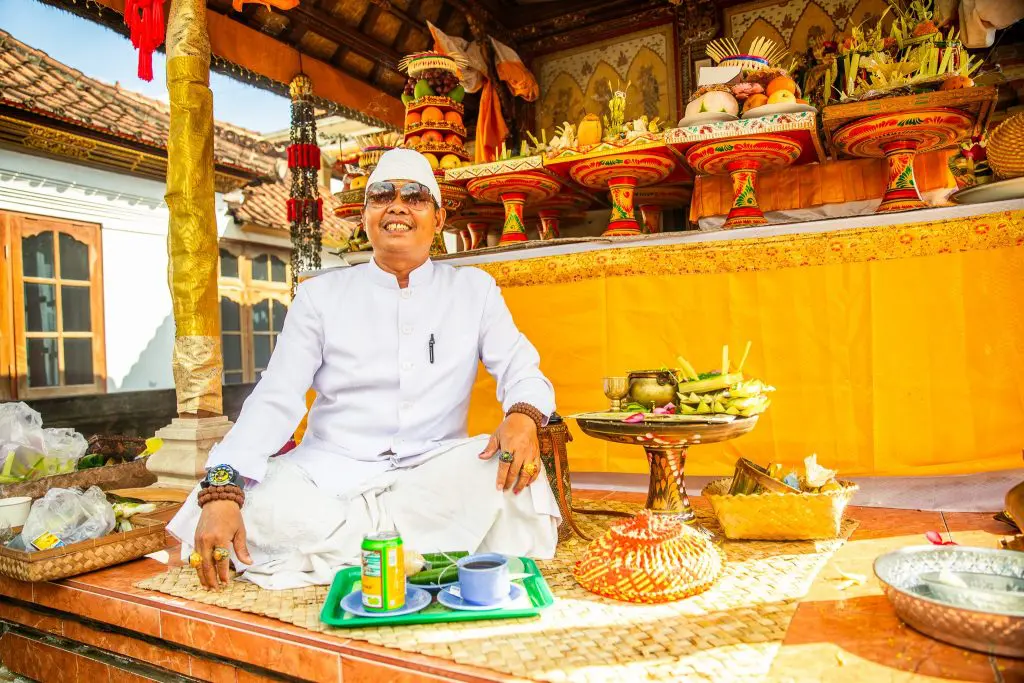
🌏 Learning Outcomes Through the CARES Lens
Community
-
Live within communities through village homestays in Bali, Fiji, and Thailand, building respect for collective systems like banjar in Bali, the vanua in Fiji, and Buddhist-informed village life in Thailand.
-
Strengthen cross-cultural communication by collaborating on projects with local youth, NGOs, and healthcare providers.
-
Experience the power of community-first models, where wellbeing and progress are built through collective values rather than individual gain.
Authenticity
-
Engage directly with local leaders, health professionals, and traditional practitioners, gaining insights rarely accessible to tourists.
-
Learn from Balinese healers and NGOs, Thai conservationists and Buddhist monks, or Fijian educators and village chiefs who guide you through authentic community priorities.
-
Participate in traditional rituals, ceremonies, and daily life, from preparing herbal medicine in Bali to joining kava ceremonies in Fiji, ensuring cultural exchange is meaningful and grounded in respect.
Regeneration
-
See how health, culture, and environment are interconnected:
-
Bali: the Subak system linking water, farming, and nutrition to community health.
-
Thailand: conservation efforts that balance animal welfare with livelihoods.
-
Fiji: marine ecology tied to food security and cultural identity.
-
-
Support regenerative projects — from health promotion in Balinese schools to coral planting in Fiji — that leave lasting, positive impact.
-
Understand how traditional philosophies like Tri Hita Karana and Vanua align with modern ideas of sustainability and wellbeing.
Education
-
Apply theory to practice by linking academic studies (healthcare, sustainability, anthropology, development) to lived experiences in the field.
-
Develop transferable skills: adaptability, resilience, problem-solving, teamwork, leadership, and cultural intelligence.
-
Engage in structured reflection and group debriefs, turning field experiences into insights that can be carried into future studies, careers, and life.
-
Build a portfolio of real-world examples — valuable for CVs, interviews, and academic work.
Skills for Life
-
Grow as a global citizen, with confidence, empathy, and awareness of diverse perspectives.
-
Strengthen career readiness with experiences that demonstrate initiative, cross-cultural collaboration, and applied problem-solving.
-
Return with memories, networks, and insights that inspire future pathways in healthcare, sustainability, social enterprise, or global development.
Through CARE approach, Think Pacific ensures every expedition in Bali, Thailand, and Fiji delivers authentic, community-driven, regenerative education that builds practical skills and global awareness — while leaving a positive legacy for the communities who host students.
Each destination offers something unique. Choose the location that speaks to your sense of adventure.
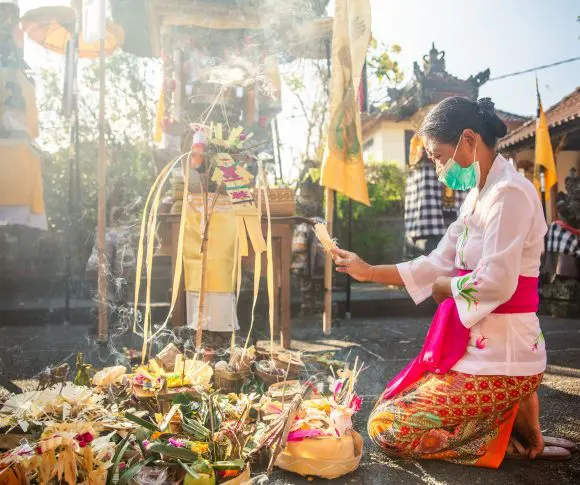
Explore Balinese culture, spirituality, and sustainable living. Bali offers unique insight into the Tri Hita Karana philosophy and community-led approaches to wellbeing, conservation and enterprise.
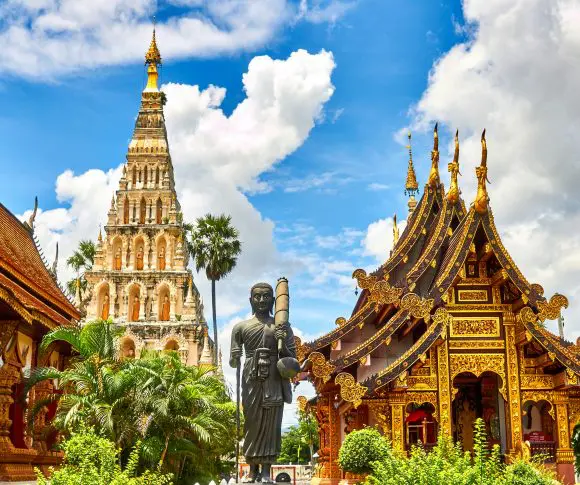
Explore Northern Thailand’s culture, biodiversity, and community-led conservation. Chiang Mai blends grassroots wildlife protection, sustainable tourism, and traditional ways of life with a thriving, purpose-driven business scene.

Explore Pacific identity, island beauty and cultural resilience. Fiji offers unparalleled immersion in indigenous knowledge systems and the chance to see how local empowerment creates change.
Think Pacific is more than a provider of programmes abroad. We’re a social enterprise and registered charity, built on one core belief: student travel should be a force for good..
Each programme is designed with integrity at every level. From the ground up, our programs are built in deep collaboration with local leaders and grassroots organisations, ensuring every experience undertaken and every story shared is community-led and culturally grounded.
But impact doesn’t stop there. We embed positive impact into everything we do: such as local suppliers over big chains, locally owned accommodation over resorts, ethical site visits over extractive tourism & cultural exchange over cultural display.
Every decision is intentional and supports local economies, preserves cultural identity, and ensures your presence is a force for good. This is global travel: reimagined.
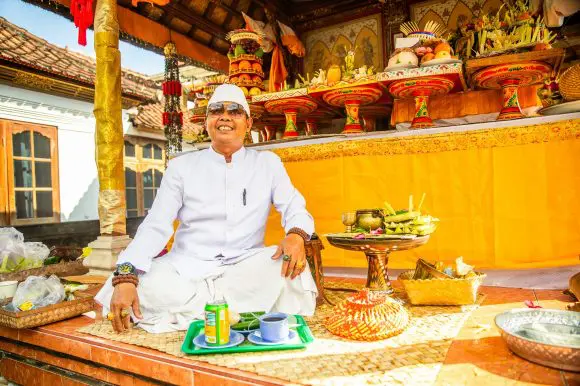
Every Expedition is co-created with communities and in collaboration with NGOs, grassroots organisations, and local leaders, to support existing, long-term initiatives. Your presence contributes to:
- ✅ Sustainable investment in local organisations and economies
- ✅ Job creation through the use of local providers and suppliers
- ✅ Capacity-building and community-led innovation
- ✅ Cultural preservation and identity empowerment
- ✅ Advocacy for climate justice and social equity
- ✅ Responsible travel that puts people before profit
This produces the ripple effect – ethical, collaborative, purpose-led travel that gives back, builds up, and means something — for everyone involved.
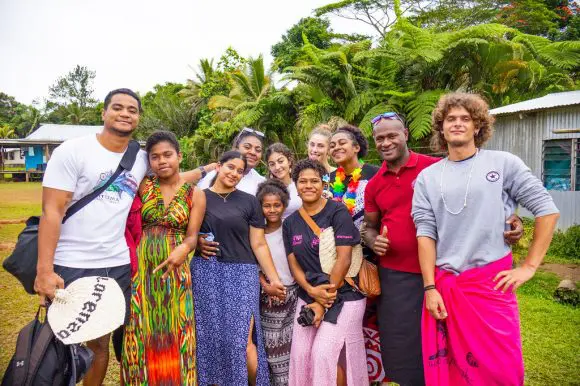
Since 2009, Think Pacific has achieved the following milestones
- Over £15 million GBP invested into our partner destinations at grass-roots level.
- 300+ jobs created for local people, from TP project leaders to partner organisation guides.
- 9 + Agreements with Government Ministries to support national priorities.
- 12,000+ students have joined us and engaged in responsible global experiences.
- 400+ community-based partners – From NGOs, to social enterprises, from locally owned eco-tourism operators, to local government, all benefiting from community based programmes.
- 1000+ initiatives Achieved Through Our Foundation – Including 200+ infrastructure projects funded for rural communities in Fiji, enabling resouce to build schools, clinics and community centres.
- 3000+ Training Opportunities For Local Youth – Providing access to internships, training programs, scholarships, leadership roles and community-based training.

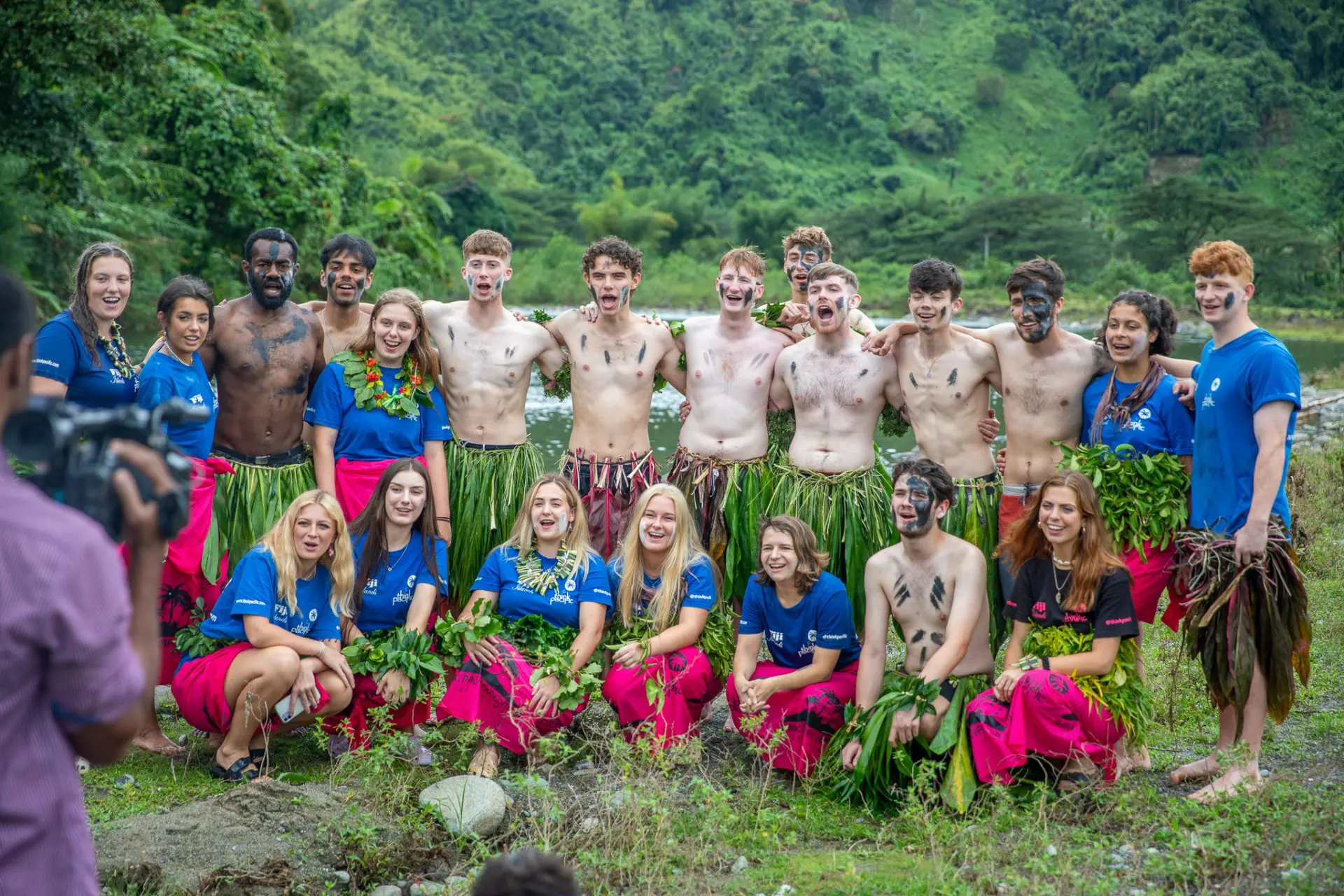
 👇
👇